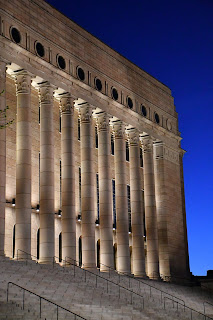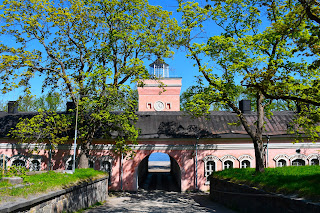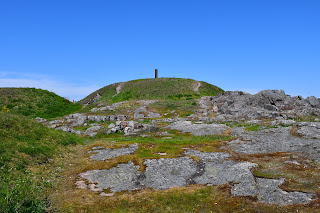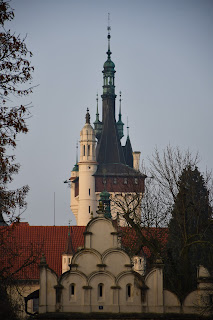The Baltics – Day 1: Helsinki
Having finally found a job, I realised I do not need to spend all my days searching for one. My new posting will begin in June, and until then I will be using this suddenly brief period of freedom to travel and visit friends. Thinking of where to go, I remembered that I thoroughly enjoyed my travels last summer, when my wanderings took me to Sweden, Norway, and Denmark. It was warm but not hot, the days overflowed with many golden hours, and the weather mostly stayed sunny. Since I have not yet been to the Baltics, the concrete choice of destination was easy.
I arrived
in Helsinki just after eleven in the evening on the 23rd of May. I
had no trouble finding the train station, where I purchased a 24-hour ticket
and boarded the train to the central station. I had done some preliminary
research on public transportation zones and prices, but this knowledge turned
out to be superfluous: a helpful electronic map on the ticket machine helps
travellers decide what tickets to buy.
The last
green glimmer of daylight faded as I made my way from the station to my hotel a
little after midnight. I found the streets in a messy state, as they were
undergoing extensive repairs, and I cursed a few times while trying to get
around the barriers. Fortunately, these manoeuvres were made remarkably easy by
the minimal traffic in Helsinki during the wee hours.
I found the
next morning quite rough. I had planned to wake up at half past eight, but the
light pounding at my windows from around five made it difficult to stay asleep.
By eight I could no longer bear it, so I took a shower, ate my breakfast, and
checked out. Since my hotel was located in the north, I continued a little
farther out of the centre to see the Sibelius Monument. To my great
embarrassment, I could not conjure up a single Sibelius tune as I made my way
over, and instead I ended up with several Grieg pieces pounding in my brain for
the rest of the day.
From the
Sibelius Monument I walked south to the Temppeliaukio Church, where I arrived
just in time for its opening. The church is noted for its modernist design,
with sides carved into the rock and a circular metal roof hovering above a band
of glass windows. Although the architect originally envisaged covering up the rock
walls, he was dissuaded from doing so by expert musicians, who pointed out that
the acoustics would be better if the original material was kept in place.
After
making another stop at the peaceful Kamppi Chapel – a golden building with a
homely wooden interior and cushions resembling stones in a zen garden – I
continued to the harbour. There is a regular ferry from the harbour to the
island of Suomenlinna, which has decks in both the front and back to give
tourists the chance to view Helsinki and neighbouring islands. Interestingly,
it is usually European tourists who take the outdoor seats, while most Asian
tourists tend to stay inside.
Suomenlinna
is of special historical interest for being an erewhile island fortress. Built
by the Swedes to defend Finland from the Russians, it was further developed by
the Russians after it failed to do so. Following Finland’s independence,
Suomenlinna remained important to the country’s defences, which is attested to
by some of the modern exhibits on the island. During my tour, I visited a WWII submarine
and tried to imagine what it would be like to serve on one. I am sure I would
hate the humidity, but seeing as the Finns are great fans of saunas, I imagine
this was not their top complaint.
For people
who are not great military enthusiasts, there is not all that much to see in
Suomenlinna, though some Finns visit the islands to sunbathe. The most visually
compelling sights in Suomenlinna include the pink hall housing the visitor
centre, the church, and the round grassy barracks on the very southern tip. The
latter also offer good views of the colourful rocks that make Suomenlinna so
difficult to access from the sea.
After I
returned to the mainland, I went directly to Helsinki Cathedral, a neoclassical
Lutheran church built under Russian rule. Its iconic domes were designed as an
allusion to famous churches built in a more Russian style: Saint Issac’s
Cathedral and Kazan Cathedral in Saint Petersburg. From there, I made another
visit to the Central Station, whose beautiful tower I had noticed on my way to
the harbour. The green copper roof of this soaring clock tower reinforces the
strong art deco presence in Helsinki while also presenting an ageless beauty.
My last
stop for the day was the Uspenski (Dormition) Cathedral. Built to serve the
needs of the orthodox religious community during Russian rule, it provides a
perfect counterpoint to Helsinki Cathedral. Whereas the Lutheran church is snow
white and gentle in its roundness, the orthodox church is blood red and
fiercely angular. The interior of Uspenski Cathedral, however, seemed less
Russian and more austerely Scandinavian than I anticipated. The heavy columns
reflected light in their bare simplicity, and the walls and ceilings had far
fewer paintings than usual for an orthodox house of prayer.
With some
time to kill and the National Library closed, I found refuge in the nearby Oodi
library. I worked there for a while before heading out to buy a quick dinner
and taking the tram to the ferry terminal (buying a day ticket has been my most
intelligent move on this trip). Feeling guilty about having had Vietnamese food
for lunch, I bought a sandwich with dill and vegan caviar and a typically
Finnish pastry: a korvapuusti, or cinnamon roll. They were both surprisingly
tasty – despite their undistinguished provenance from a train station
supermarket.
I always
find something to surprise me and impress me on my travels. This time, it was
the process of checking in for my ferry. When I arrived at the terminal, I
simply went up to one of the self-service machines, put in my codes, and
received a ticket with my name printed on it. Swiping my ticket on the reader
was the last stage in the process; I proceeded directly from the waiting hall
to the ship, which was practically a giant floating shopping mall. I arrived in
Tallinn at around half past nine.





































Comments
Post a Comment